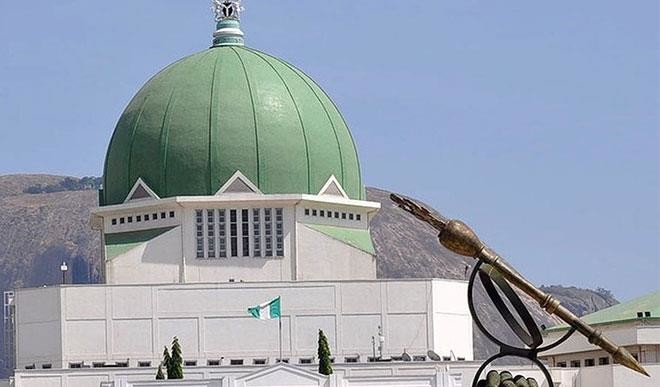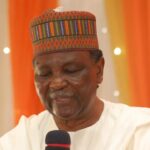
If the cliché that action speaks louder than words is still current, then the recent faceoff between the principal officers of the National Assembly and the security details at the Presidential Villa (Aso Rock) qualifies for a more profound consideration. Seen closer it connects with history in one vein, breach of protocol in another, and more disturbingly suggests a glitch in the security architecture covering the Three Arms Zone Abuja, which hosts the all-important institutions of the Presidential Villa, National Assembly and Supreme Court.
According to media reports the twenty Principal Officers of the National Assembly (ten each from the Senate and House of Representatives) had gone to the Presidential Villa on invitation from President Muhammadu Buhari, in a single official Coaster Bus (instead of their individual official vehicles). On arrival at the Villa’s gate they were asked to disembark for individual clearance, except for the President of the Senate Bukola Saraki and Speaker of House of Representatives Yakubu Dogara. The entire team of Principal Officers disagreed with the directive, promptly reversed and went back to their offices. The Chief of Staff to the President Abba Kyari later went to the National Assembly to formally apologise and secure the return of the National Assembly officials for the meeting with the President.
Ever since, both sides had tried to downplay the development while public comments on it have been varied. For instance some commentators have even argued that the legislators even as public officers are not superior to ordinary Nigerians. Hence they should have demonstrated “respect for law and order” and complied with the instructions of the security operatives, as nobody including them, is above the law of the land. Good logic one would say except that it collapses on grounds of inherent presumptions that draw from a jaundiced interpretation of officialdom, which even denigrates the legislature.
In the first place, legislators – in their official capacities and at any tier of governance in the country, are by statute not exactly “ordinary people” but duly and democratically elected representatives of constitutionally delineated legislative constituencies. They are essentially politically exposed persons whose status is defined by their representative capacities. By the same fact their profiles and official engagements remain at the disposal of designated security personnel. In the second place the visiting federal legislators were the designated principal officers of the only two chambers of the National Assembly and are therefore no strangers to a cross section of the Nigerian public and in particular the security operatives in the Villa. The National Assembly routinely and dutifully facilitates the maximal exposure of the identities of its principal officers, through a coordinated process of dedicated correspondence and media launched initiatives for the benefit of designated public institutions (security agencies in particular) and the general public. It is also easy to appreciate that these same principal officers of the National Assembly also feature routinely in the official protocol schedule of the Villa.
Principal Officers in the National Assembly include the Presiding Officers as well as Leaders and Whips of majority and opposition political parties. Hence the leadership of the National Assembly, like that of any other legislative chamber that is worth its salt all over the world, is not vested in just one individual as it is with the executive arm. It operates on the parliamentary culture of carrying along all relevant interests that facilitate synergy in their enterprise. Such is the essence of the beauty of collective decision making in the parliament.
Thirdly and most significant is that the entire Three Arms Zone enjoys a common security architecture whereby the same network covers the Villa, National Assembly and the Supreme Court. Put more graphically the same officers that guard the Presidency are also those that guard the National Assembly where they are even assigned to individual principal officers for ‘close marking’ (that is borrowing from the world of soccer). Ordinarily therefore it is inexcusable for the principal officers to be missed by the Villa security details.
It is therefore also inconceivable that the mission of designated principal officers of the National Assembly who are officially honouring the invitation from the President and have been cleared by the security component in their base to commence on such venture, would be unknown to components of the same security network at another point of the same beat. In the circumstance it is difficult to suppress concern over possible mistrust among the various components of the Three Arms Zone security architecture. It is either that the Villa component does not trust their counterparts in the National Assembly and or, there is an outright power play among the guards. Either way the situation offers little to cheer about.
In another vein historical facts on the no love lost relationship between the Villa and the National Assembly since the return of democracy in 1999 suggest that there is more than meets the eye, in this development under consideration. For instance it is common knowledge that throughout his eight year tenure President Olusegun Obasanjo waged a protracted cold war with the National Assembly in his bid to cut the institution to size. In the process he launched a precedent of less than benign acrimony between the Villa and the National Assembly which some over-zealous officers in the former are allowing themselves to be guided by. Obasanjo’s two succeeding Presidents of Umaru Yar’ Adua and Goodluck Jonathan were reportedly not disposed to being vigorous in cutting the National Assembly to size in their predecessor’s style.
But with the new development and others in recent past questions arise over whether there is a return to the ignoble past of war-war instead of jaw-jaw between Villa and the National Assembly, especially with the return of another retired General in the person of President Muhammadu Buhari? This is even as his body language and public statements vindicate him as a man with deep democratic convictions. This is attested to in the prompt response in from the Chief of Staff to the President Abba Kyari in resolving the impasse. Courtesy of Abba Kyari’s speedy intervention, it is clear that Buhari himself would not have been a part of the plot to humiliate the principal officers through jackboot politics as played out by the Villa security details.
Beyond the fore going is also the issue of the disposition of the National Assembly itself to the long drawn syndrome of denigration of its status which has ostensibly led to the issue under consideration. Who knows if due to the growing public misgivings on a seeming incontinence of the country’s legislature with respect to some burning national issues, the security details at the Villa – Nigerians they are, were only dramatizing public perception of the country’s legislators as toothless bull dogs, full of bark, grovel and noise. But no bite.

 Join Daily Trust WhatsApp Community For Quick Access To News and Happenings Around You.
Join Daily Trust WhatsApp Community For Quick Access To News and Happenings Around You.


